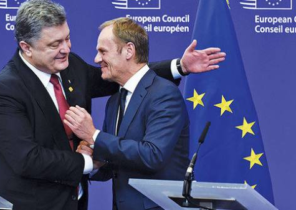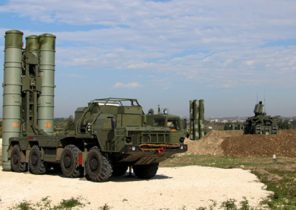
Despite objections from antitrust authorities in Poland, Russia not backing down. Energy giant Gazprom insists that it will build the gas pipeline “Nord stream-2” at the bottom of the Baltic sea — even if I have to do it alone. The pipeline would run adjacent to the existing “Northern stream-1”. And, according to Ukraine if it gets built, it will no longer be able to act as intermediary for Russian gas exports to Europe.
“Now Russia is moving its traditional transit through Ukraine to Nord stream, — said Andriy KOBOLEV, the head of the company “Naftogaz of Ukraine”. — If you look at the figures of gas consumption in Europe up to 2020, it is obvious that with the advent of the “Nord stream-2” and the extension of the gas pipeline “Turkish stream”, which is happening now — instead of one of the branches there will be two — this means that the Ukrainian transit of Russian gas to Europe will be equal to zero.”
“Naftogaz of Ukraine” is a Ukrainian door of “Gazprom” in Europe. Ukraine currently does not import Russian gas for their own consumption. But she gets paid for the transportation of Gazprom’s gas via pipelines that pass through Ukrainian territory. According to government estimates, the money received from Russia as payment for this transit, are about 10% of the Ukrainian budget. If there is not, it will be a big problem for the Ukrainian economy.
“The gas that goes to Europe via Ukraine still belongs to “Gazprom”, — said Korolev in a telephone interview from London last weekend. — Russia is our partner. But these pipelines are interdependent. On the one hand, we want to preserve Gazprom as a client: he still need us to get into Europe. On the other hand, is all about Russia. After all, if the “Nord stream-2″ is built, they will not have our pipeline. Or will they use it much less.”
Naftogaz and Ukraine are currently engaged in a legal dispute on the issue of transit fees. Their claim against the Russian energy giant is the largest arbitration case that has ever addressed by the International court in Stockholm.
Now, when the President was Donald trump, it’s unlikely that Washington is to raise awareness of the danger for Ukraine is “Nord stream-2”.
The EU is under pressure from private oil giants — including the companies in Germany, where Chancellor Angela Merkel is apparently softens its position in relation to the new Baltic pipeline. Companies such as Shell and Basf claim that the pipeline will supply Russian natural gas to Northern Europe. The countries of southern Europe complain that it is beneficial to the North. But now they will have a “Turkish stream”, which quickly turns into “Turkish stream-1” and “Turkish stream-2”. If we talk about the scale of construction, Russia is now constructing two times more pipeline in the European direction. Even if in the next decade, consumption in Europe has doubled, where would fit in Ukraine for its transit role?
Naftogaz, for its part, is now working on signing energy trade agreements with the EU, so that both sides can keep Ukraine as a transit country in the future. But so far nothing concrete.
The publication of The Foreign Policy on Wednesday quoted Tim Boersma (Tim Boersma) from the Center on global energy policy at Columbia University. In his opinion, the second pipeline does not mean Ukraine will be in a stalemate. “When was built the “Nord stream”, it did not become a geopolitical disaster, he said. — History has shown that the fears and the escalation of geopolitical panic was largely unfounded”.
But this time things may be different.
Ukraine and Russia since February 2014 conflict. It was then Pro-Russian President Viktor Yanukovych was ousted during the so-called Euromaidan. The reason for this uprising — one of many during the period of post-Soviet Ukraine became Ukraine’s rapprochement with the European Union. The Kremlin is regarded as Ukraine’s rapprochement with NATO. Russia reacted by seizing the Crimean Peninsula and encouraging the separatist movement in Eastern Ukraine, for which he received sanctions from Brussels and Washington. Former allies in the field of culture and politics started a “divorce” process, and this year will stand trial in Stockholm. Depending on the outcome of this arbitration process, Russia and Ukraine will either restore the relationship or even more away from each other.
Last week the European Commission published its second report on the state of Affairs in the energy sector. According to the report, the EU is well on track to the goals that it must achieve by 2020. Among them — reduction of emissions of greenhouse gases, improving energy efficiency and developing renewable sources of energy. But, as has repeatedly warned the expert, the Hague centre for strategic studies on issues of Russian gas Sijbren de Jong (Sijbren de Jong), “Nord stream-2” in this case is not a necessity. In the report the construction of a second Baltic pipeline to ensure energy security is not even mentioned.
“This project only contributed to the diversification of the routes for Gazprom, which is trying to reduce its dependence on Ukraine and to strengthen the dominant position in the German gas market by increasing its stake to over 50%,” says de Jong. Given the fact that the “North stream-1” already is the main route, another similar pipeline would mean that more than half of Russian gas to Europe will flow through the Baltic sea.
Many of the major players pulling out of the deal. “Gazprom” already has become, or is close to becoming the main owner of the project. In the end, the European Commission may abandon the pipeline, if it becomes clear that local companies are not interested in it.
Russia calms “Naftogaz of Ukraine”: “do Not panic. It is solely a business decision”.
COBOL does not think so. Like de Jong, who frequently criticizes everything I do Russian. He asks the question of why Gazprom and its partners are so eager to rent the Swedish harbour in the Baltic sea instead of using Kaliningrad in Russia. It would be cheaper than paying Sweden. And if they updated the Russian ports, it would benefit the Russian economy in the region.
“It would be logical from the point of view of the market and, undoubtedly, would allow to reduce the cost of the project, says de Jong. — Such action would fit perfectly into the strategy of the Russian government to stimulate local production. Because the project “Northern stream-2″ is a clean business, isn’t it?”







